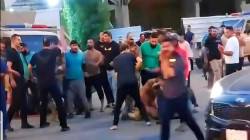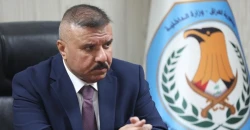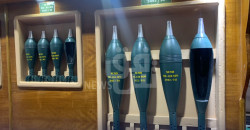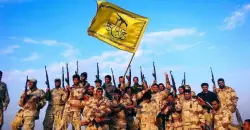"Centralizing Weapons in State Hands" Initiative in Iraq: challenges and benefits
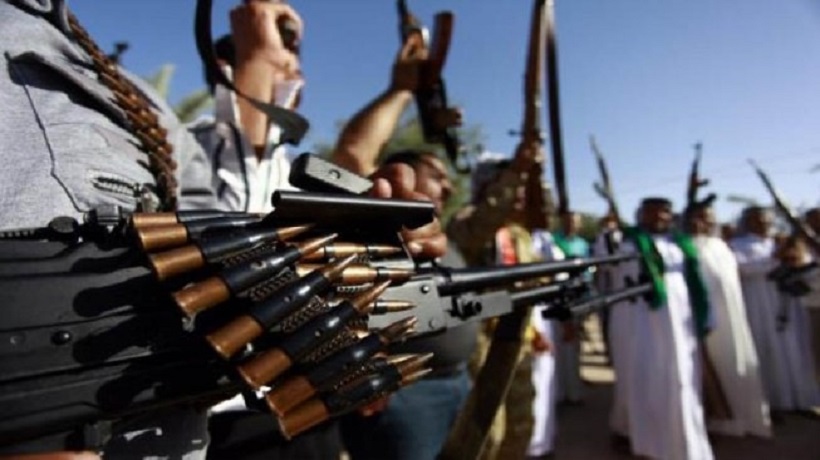
Shafaq News/ The persistent challenge of loose weapons in Iraq has prompted the government to embark on a bold initiative, "Centralizing Weapons in State Hands."
Spearheaded by the Ministry of Interior, this comprehensive plan aims to regulate and purchase citizens" weapons, addressing a critical issue that poses threats to national security and societal well-being.
Fifteen Million Pieces of Weapons
The proliferation of illegal weapons in Iraq stands out as one of the most pressing challenges impeding security and stability in the country, with significant implications for societal safety.
Iraqi Prime Minister Mohammed Shia al-Sudani pledged to address this phenomenon beyond the scope of official and legitimate state institutions in his government program.
While there is no official tally accounting for the number of weapons within the Iraqi society, estimates usually range between 13 and 15 million pieces of medium and light weapons.
Prominent among these are AK-47 rifles, PKC rifles, and Russian RPGs, along with mortar launchers and RPG shells, which have recently seen increased use in tribal conflicts in the south and central regions of the country.
Armed groups in the country, along with tribes, predominantly possess these weapons.
Simultaneously, Iraqis have developed a post-2003 cultural inclination to keep weapons in their homes, driven by the necessity to "defend themselves against thieves and anticipated assaults."
The Government and Weapon Procurement
The Iraqi Ministry of Interior recently announced the launch of a new project aimed at "Centralizing Weapons in State Hands," involving the purchase of weapons from Iraqi citizens. The ministry affirmed that "697 weapon purchase centers are ready, in addition to an electronic platform designated for this purpose."
It marks the first time that Iraqi authorities have sought to purchase weapons from their owners under the project initiated by all governments since 2005, without notable progress. On the contrary, loose weapons have become accessible and a cause for crimes and assaults.
In this regard, Colonel Mansour Ali Sultan, Secretary and Rapporteur of the Permanent National Committee for Weapons Regulation and Centralization in State Hands, stated in an interview with Shafaq News that "this campaign has commenced in line with the government program announced by the Prime Minister in October 2022."
"The campaign consists of four phases, starting from January 1, 2023, and extending until December 31, 2024. The first phase involves registering citizens’ weapons in their residential areas for those who wish to do so, focusing on registering citizens’ light weapons (rifles or pistols).”
He added, "The Cabinet allocated 16 billion dinars to each police command for the purchase of these weapons, with Baghdad receiving two billion dinars, considering its division into Al-Karkh and Al-Rusafa."
Colonel Sultan clarified that "the technical and financial committee is currently working on determining suitable prices for the weapons." He noted that "medium and heavy weapons, such as PKC rifles and support weapons, are included in the purchase."
"There are procedures to be followed if citizens do not comply with selling these weapons to the state by the end of the specified period at the end of December 2024…citizens must register their weapons and acquire licensed ones because, after the deadline, there will be inspections of unlicensed weapons," according to the security official.
Colonel Sultan emphasized that "as part of this campaign, efforts are being made to combat tribal manifestations, control live ammunition, and coordinate with security forces through the Ministry of Defense, the National Security Agency, the Intelligence Agency, and the Popular Mobilization Authority." He confirmed that "efforts are underway to close websites promoting weapon sales, and 119 weapon-selling stores have been closed across Iraq, in addition to suspending violent electronic games encouraging weapon acquisition and crime. Currently, we are in the process of combating 11 games in this regard."
The Colonel pointed out that "part of our tasks is to compile a database of stolen and confiscated weapons, and there is collaboration with tribes, universities, and all directorates of education. There is citizen interest in registering their weapons in their residential areas, and we will not charge any fees for this service. Registration is done electronically to alleviate the burden on citizens and avoid bureaucracy."
According to previous statements by the Secretary of the Permanent National Committee for Weapons Regulation in the Ministry of Interior, Colonel Mansour Sultan, "the weapons seized from citizens amounted to 25 tons."
Incentives Are Not Enough
Despite government entities not officially announcing the purchase prices of weapons from citizens, according to officials in the Ministry of Interior, activists warn of the inadequacy of financial incentives to buy weapons. The price of the AK-47 rifle, for example, may be higher than its market value by about 20%. The value of medium and heavy weapons will likely be doubled due to their danger, aiming to entice citizens to sell them to the government.
Military experts also consider that the decision will not reduce weapon possession but encourage trade.
On the other hand, some argue that the step of purchasing unlicensed weapons from citizens addresses part of the loose weapons problem. However, due to the tribal and clan nature of Iraqi society, the government may face difficulty in executing this process.
In this context, MP Yasser Iskandar Wattout, a member of the Parliamentary Security and Defense Committee, stated in previous remarks to Shafaq News that "there is no control over weapons in Iraq, and it will not be controlled," emphasizing the importance of the Ministry of Interior's step in registering weapons, stating that it helps "determine the number of weapons spread in the country and reveals their origin in case of any criminal incidents."
Reverse Smuggling of Weapons
Observers expressed concerns that the seemingly beneficial project requires vigilance from relevant authorities to guard against potential exploitation by unlawful money laundering networks.
These networks, implicated in embezzling public funds, might exploit this initiative to enhance the security of their assets by purchasing weapons from various sources, including abroad. Subsequently, they could sell these weapons to the Iraqi government using official invoices, legitimizing their money laundering operations.
According to observers, this scenario could also apply to suspicions of reverse smuggling of inexpensive weapons within Iraq. These weapons may be sold as personal arms in exchange for profits, serving the interests of smuggling networks that use every possible means to achieve financial gains through illicit channels.
Kurdistan Region and Weapon Purchase
While the Iraqi government has exempted the Kurdistan Region from its weapon collection campaign, it can be said that the Kurdistan Regional Government (KRG) took the lead in implementing such measures even before Baghdad.
The Kurdish Government set a final deadline of July 21, 2023, for citizens to surrender their unlicensed weapons after extending the deadline several times, according to a statement issued by the government at that time.
The Director General of Diwan at the KRG Ministry of Interior, Hemn Merany, warned that "anyone apprehended with an unregistered weapon will have a dedicated file opened against them at the police department based on Article 15 of the Arms Law. They will be brought to court, sentenced to imprisonment, and fined simultaneously."
Merany revealed that "more than 90 centers are available for citizens to visit and register their weapons," emphasizing the government's efforts to reduce the quantities of unlicensed weapons in Kurdistan's society. He stated that as the amounts of weapons, especially unlicensed ones, increase, the chances of crime also rise.
"Citizens can submit applications to register licensable weapons or sell them in officially designated locations."
Furthermore, the Ministry of Interior in the Kurdistan Region outlined seven conditions for granting weapons-carrying licenses, including being an Iraqi resident of the Kurdistan Region, being at least 21 years old, having good character and behavior, not being accused of committing non-political crimes or offenses, being physically, mentally, and psychologically fit to carry a weapon, being technically qualified, obtaining the weapon legally, and having a legitimate reason for carrying it.
In addition, Article 15 of Law No. 2 of 2022 on weapons stipulates that anyone caught carrying an unlicensed weapon or ammunition (bullets) will be imprisoned for one to three years, a fine of two to five million dinars, and the confiscation of the weapon.
Fate of Other Weapons
In the context of discussing arms purchases, questions arise, according to observers and activists, about the fate of weapons belonging to armed groups or the party-affiliated arms present in Iraq semi-officially.
These arms can be used to serve partisan and sectarian agendas, occasionally manifesting through military displays and unmarked vehicles roaming the streets of the capital and other governorates, sometimes leading to attacks on state officials from traffic police, security personnel, and others on the roads.
They have been utilized in previous events, including the protests of October 2019 and other incidents in Iraq, raising the question of whether these entities can surrender their weapons in line with this initiative.
Maridi Market: A Vast Arsenal
When discussing the weapons issue in Iraq, the "Maridi Market" in the Sadr City district of eastern Baghdad comes to light.
The market is considered a "hub for weapons where any piece can be easily purchased."
According to observers and citizens, the market is a stronghold of illegal weapons where the perpetrators are free to move from one governorate to another within days. Additionally, there is a persistent threat posed by these weapons to the lives of innocent citizens in the area.
